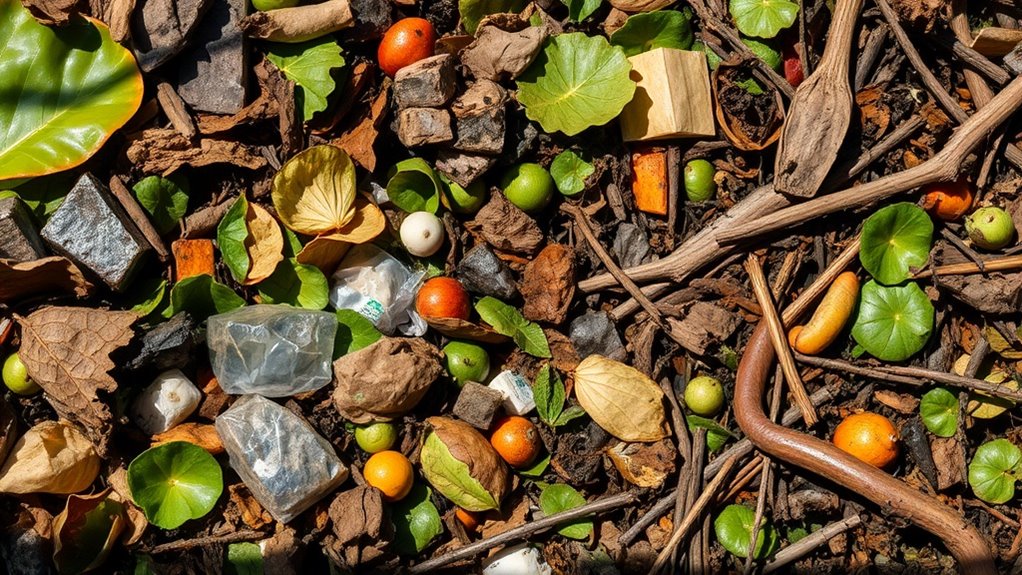This One Trick Speeds Up Your Compost Pile
If you’re looking to speed up your compost pile, understanding the process is crucial. The breakdown of organic matter relies heavily on beneficial microbes and proper aeration. But what if there’s a simple trick that can significantly enhance this process? By introducing a compost accelerator, you can boost microbial activity and nutrient availability, transforming kitchen scraps into rich humus much faster. Discover how to implement this technique effectively and monitor your compost for optimal results.
Key Takeaways
- Add a compost accelerator to provide beneficial microbes and essential nutrients for faster decomposition of organic materials.
- Ensure a balanced mix of green and brown materials to improve airflow and enhance the accelerator’s effectiveness.
- Regularly turn the compost pile every 1-2 weeks to aerate and promote efficient breakdown.
- Maintain optimal moisture levels, keeping the pile damp but not soggy, to support microbial activity.
- Monitor the pile temperature weekly to confirm active decomposition and make adjustments as needed.
Understanding the Composting Process
Have you ever wondered what really happens inside your compost pile? The composting process involves microorganisms breaking down organic matter into nutrient-rich humus.
To compost faster, it’s crucial to balance carbon-rich materials, like dried leaves, with nitrogen-rich items, such as kitchen scraps.
The right ratio accelerates decomposition, creating heat that helps kill pathogens.
Moisture also plays a key role; too dry or too wet conditions can hinder microbial activity.
By understanding these dynamics, you can create an optimal environment, ensuring your compost pile breaks down efficiently. Incorporating fast composting techniques can further enhance the speed of decomposition.
Keep monitoring these factors, and you’ll be amazed at how quickly your compost transforms!
The Importance of Aeration
How can you ensure your compost pile breaks down efficiently? Aeration is key.
When you regularly turn your pile, you introduce oxygen, which supports aerobic bacteria crucial for decomposition.
These bacteria thrive in oxygen-rich environments, breaking down organic matter faster than their anaerobic counterparts.
Without proper aeration, your compost can become compacted, leading to unpleasant odors and slower decomposition.
Aim for a balance of green (nitrogen-rich) and brown (carbon-rich) materials, as this mix also aids airflow. Additionally, accelerated decomposition can be achieved by maintaining an optimal moisture level in your compost pile.
Introducing the One Trick
One simple trick can dramatically speed up your compost pile: adding a compost accelerator.
This concentrated blend of nutrients helps to jumpstart the decomposition process, ensuring your organic materials break down more efficiently.
Here’s what makes a compost accelerator effective:
- Microbial Boost: Introduces beneficial microbes that enhance breakdown.
- Nutrient-Rich: Supplies essential nitrogen and phosphorus for rapid composting.
- Balanced pH: Helps maintain optimal acidity for microbial activity.
- Time Saver: Reduces the time it takes to produce rich, finished compost.
Additionally, using a compost accelerator can enhance the decomposition process, making it easier to maintain a healthy compost pile.
Tips for Implementation
To effectively implement a compost accelerator, start by evenly distributing it throughout your compost pile.
Sprinkle it over the surface, then mix it in to ensure it penetrates the organic materials.
Aim for a balance of green (nitrogen-rich) and brown (carbon-rich) materials; this enhances the accelerator’s effectiveness.
Keep your pile moist but not soggy, as moisture aids microbial activity.
Additionally, chop large materials into smaller pieces to speed up decomposition.
Finally, consider adding a layer of finished compost or soil to introduce beneficial microbes.
This method not only speeds up decomposition but also creates odor-free composting, which is essential for maintaining a pleasant environment during the process.
Following these steps will optimize your composting process and significantly reduce breakdown time.
Monitoring and Maintenance
After implementing a compost accelerator, keeping an eye on your pile’s progress is key.
Regular monitoring ensures optimal decomposition and helps you make necessary adjustments.
- Check the temperature weekly; a hot pile indicates active breakdown.
- Turn the pile every 1-2 weeks to aerate and speed up the process.
- Assess moisture levels; your compost should feel like a damp sponge.
- Look out for odors; unpleasant smells signal an imbalance that needs correction.
- Additionally, consider incorporating small space solutions that can enhance your composting efforts in urban environments.





